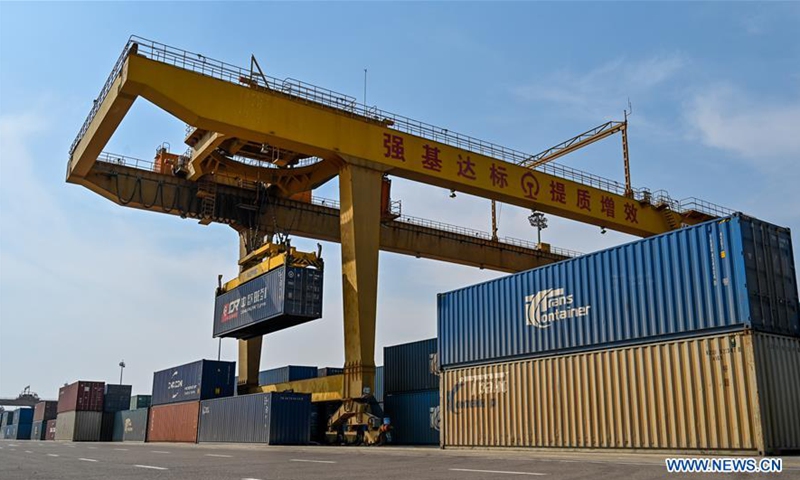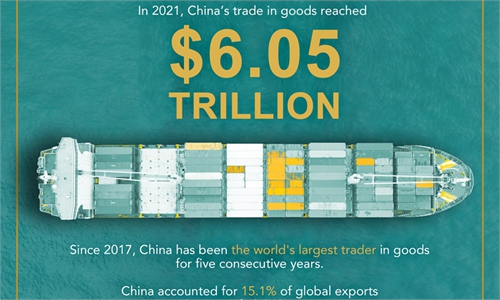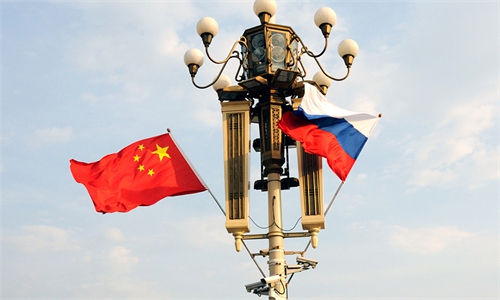Chinese, Russian companies pursue rising yuan trade settlements
Companies anticipate greater cooperation of BRICS economies

A crane loads containers at the Manzhouli Railway Station in Manzhouli, north China's Inner Mongolia Autonomous Region, April 13, 2020. Manzhouli, the largest land port on the China-Russia border, saw a rising number of China-Europe freight trains during the first quarter this year. The number of freight trains that ran between China and Europe via Manzhouli went up 8 percent year on year to 591, transporting a total of 52,947 standard containers of cargo in the period. (Xinhua/Yu Jia)
Traders see a growing potential for local currency settlements in trade, especially between China and Russia under the BRICS (Brazil, Russia, India, China and South Africa) framework, as the countries are seeking alternatives to chip away at dollar dominance.
While the US dollar hegemony continues to shadow world trade, closer economic and trade ties would be needed more than ever among the BRICS member states, and further cooperation in areas such as local currency settlement could be brought up at the upcoming BRICS Summit, experts said.
A manager with the Russian Asian Union of Industrialists and Entrepreneurs surnamed Wang told the Global Times that there are many Russian products that were originally intended for the Japanese and South Korean markets that are now being exported to China and India after US-led broad economic sanctions against Russia.
Among the products are fertilizer and oil, major export goods for Russia.
"Most of our member companies are using the yuan for cross-border trade settlements instead of US dollars or other currencies, because yuan settlement is much faster and more practical," Wang said.
Driven by the trend, an increasing number of Russian companies are looking to open accounts at branches of Chinese banks in Moscow. Given the high popularity of the yuan in trade settlements, companies have to wait until December to open new accounts, two sources familiar with the matter told the Global Times on Monday.
Purefine Wood Trade Agency, a Changzhou-based trading company in Jiangsu Province, which is a wood trader with Russia, told the Global Times on Monday that recently, Russian businessmen are actively seeking to explore the Chinese market or other overseas markets such as India, while their main export market was originally Europe.
The company is importing wood from Russia and basically using yuan or ruble settlement instead of using US dollars.
Purefine Wood Trade Agency is also looking at exporting items, such as electronic and mechanical products, to Russia.
"They are very popular in Russia and have great [market] potential," a person with the company said.
Some Russian traders receive payment in yuan, and then use the payment to buy Chinese goods, the Global Times learned.
Given the rising trend for local currency settlement, experts believe that the topic could be brought up at the virtual 14th BRICS Summit in Beijing on Thursday and Friday, to fend off risks from the US dollar settlement system, while smooth and diversified trade is expected to be promoted.
Closer economic and trade ties would be needed more than ever among the BRICS economies, and further cooperation in areas such as local currency settlement could be brought up at the summit to smooth trade, Li Ziguo, a senior research fellow with the China Institute of International Studies, told the Global Times on Monday.
In 2021, China-Russia trade using local-currency settlement accounted for 24 percent of total bilateral trade settlements, hitting a record high.
Meanwhile, after Western sanctions, Russia has been increasing the proportion of the yuan in its currency reserves, experts said.
There would be a promotion of the local currency settlement system under the BRICS framework at this year's summit, though it takes time, Li said.
Yuan/ruble settlements between China and Russia have been used in some fields, and ruble/rupee settlements between India and Russia are under study. This means that the process of local currency settlements in the BRICS framework is advancing, Li said.
"The upcoming summit will be a positive message to businesses as a new cooperative framework could be expected," Li said.



